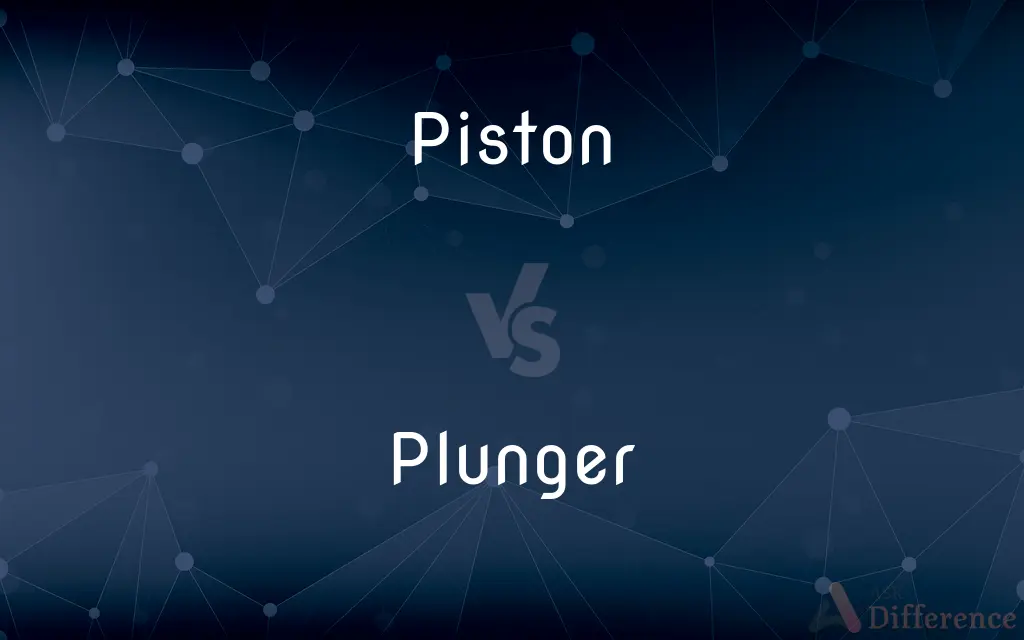Piston vs. Plunger — What's the Difference?
By Tayyaba Rehman — Updated on October 30, 2023
A Piston is a moving cylindrical part in engines, whereas a Plunger is a tool for creating suction or unclogging.

Difference Between Piston and Plunger
Table of Contents
ADVERTISEMENT
Key Differences
Piston and Plunger are both mechanical devices, but they serve different primary functions. A piston is typically a cylindrical component in engines and compressors that moves up and down or back and forth within a cylinder. On the other hand, a plunger primarily creates suction in tubes or is used to clear blockages in pipes and drains.
In engines, a piston plays a vital role in producing motion. When fuel combusts, it pushes the piston, which then transfers that energy to turn the crankshaft. The plunger, however, is generally a simple device where its main function is to force air or fluid in one direction, often to clear blockages.
Pistons are usually made from durable materials like aluminum or steel, as they must endure high temperatures and pressures, especially in combustion engines. Plungers, depending on their application, can be made from rubber, plastic, or metal.
When you think of a piston, you might envision car engines, compressors, or pumps. These devices utilize the repetitive motion of pistons to either create power or move fluids. On the contrary, when you think of a plunger, you might picture a bathroom tool used to unclog toilets or a device used to push medicines through a syringe.
The maintenance and care of pistons are different from plungers. Pistons require regular check-ups, lubrication, and sometimes replacement due to wear and tear. Plungers, being simpler devices, generally need little maintenance beyond cleaning.
ADVERTISEMENT
Comparison Chart
Primary Function
Produces motion in engines
Creates suction or clears blockages
Typical Material
Aluminum or steel
Rubber, plastic, or metal
Common Application
Car engines, compressors, pumps
Bathrooms, syringes, industrial pumps
Movement
Moves up and down or back and forth within a cylinder
Simple push or pull action
Maintenance
Requires regular check-ups and lubrication
Generally needs cleaning
Compare with Definitions
Piston
A cylindrical component in engines.
The piston transfers energy from the fuel's combustion to the crankshaft.
Plunger
A device for unclogging drains.
I used a plunger to clear the blocked sink.
Piston
A device in pumps that moves fluid.
The water pump's piston ensures consistent water flow.
Plunger
An electrical switch component.
When the plunger is pressed, the circuit completes.
Piston
A part in some types of guns to drive out the bullet.
The gun's piston provides the necessary force to fire.
Plunger
A tool for creating a vacuum in tubes.
The laboratory used a plunger to extract samples.
Piston
An integral part in pneumatic systems.
Air compressors rely on the piston's movement to compress air.
Plunger
A plunger, force cup, plumber's friend or plumber's helper is a tool used to clear blockages in drains and pipes. It consists of a rubber suction cup attached to a stick (shaft) usually made of wood or plastic.
Piston
A movable disk in musical instruments like organs.
The organ's piston controls airflow to produce different notes.
Plunger
One who plunges or dives.
Piston
A piston is a component of reciprocating engines, reciprocating pumps, gas compressors, hydraulic cylinders and pneumatic cylinders, among other similar mechanisms. It is the moving component that is contained by a cylinder and is made gas-tight by piston rings.
Plunger
A device consisting of a rubber suction cup attached to the end of a stick, used to unclog drains and pipes. Also called plumber's helper.
Piston
A solid cylinder or disk that fits snugly into a larger cylinder and moves under fluid pressure, as in a reciprocating engine, or displaces or compresses fluids, as in pumps and compressors.
Plunger
A part of a machine, tool, or device that operates wtih a thrusting or plunging movement, such as a piston.
Piston
(Music) A valve mechanism in brass instruments for altering the pitch.
Plunger
A device that is used to remove blockages from the drain of a basin or tub, by suction.
Piston
A solid disk or cylinder that fits inside a hollow cylinder, and moves under pressure (as in an engine) or displaces fluid (as in a pump)
Plunger
The internal piece of a syringe that pushes out or pulls in any contents.
Piston
(music) A valve device in some brass instruments for changing the pitch
Plunger
The sliding activator of an exploder, an electrical generator used to trigger electrical detonators such as blasting caps.
Piston
(intransitive) To move up and down or in and out like a piston.
Plunger
The part of a cafetière that is pushed down to remove grounds from coffee.
Piston
A sliding piece which either is moved by, or moves against, fluid pressure. It usually consists of a short cylinder fitting within a cylindrical vessel along which it moves, back and forth. It is used in steam engines to receive motion from the steam, and in pumps to transmit motion to a fluid; also for other purposes.
Plunger
One who plunges; a diver.
Piston
United States neoclassical composer (1894-1976)
Plunger
A horse that plunges, or throws itself suddenly forward.
Piston
Mechanical device that has a plunging or thrusting motion
Plunger
(military) A cavalryman.
Plunger
A device similar to a piston but without a mechanism; a long solid cylinder used, instead of a piston or bucket, as a forcer in pumps.
Plunger
The moving portion of a solenoid.
Plunger
(pinball) The spring-loaded assembly that propels the ball onto the table.
Plunger
A reckless gambler or gamble.
Plunger
(pottery) A boiler in which clay is beaten by a wheel to a creamy consistency.
Plunger
(firearms) The firing pin of a breechloader.
Plunger
One who, or that which, plunges; a diver.
Plunger
A long solid cylinder, used, instead of a piston or bucket, as a forcer in pumps.
Plunger
One who bets heavily and recklessly on a race; a reckless speculator.
Plunger
A boiler in which clay is beaten by a wheel to a creamy consistence.
Plunger
The firing pin of a breechloader.
Plunger
Someone who risks losses for the possibility of considerable gains
Plunger
Someone who dives (into water)
Plunger
Hand tool consisting of a stick with a rubber suction cup at one end; used to clean clogged drains
Plunger
Mechanical device that has a plunging or thrusting motion
Plunger
A part in a syringe to push out liquid.
The nurse depressed the plunger, administering the vaccine.
Plunger
A piece in a pinball machine.
He pulled back the plunger and released, launching the pinball.
Common Curiosities
Are pistons always made of metal?
While many pistons are made of metals like aluminum or steel, they can be made of other materials depending on the application.
Can you find pistons in a car?
Yes, pistons are integral parts of internal combustion engines in cars.
Is a plunger the same as a bathroom plunger?
While the term "plunger" often refers to a bathroom tool, it can also refer to other devices that create suction or push substances.
How do you maintain a plunger?
Plungers generally need cleaning and occasional inspection for wear.
Can a piston be found in musical instruments?
Yes, some musical instruments like organs have movable disks called pistons.
Are there electrical applications for plungers?
Yes, plungers can be components in electrical switches.
Are pistons involved in the combustion process of an engine?
Yes, in combustion engines, the combustion of fuel pushes the piston, transferring energy.
Do plungers and pistons work on similar principles?
While both can move fluid or air, pistons are typically used in engines for motion, and plungers for creating suction or clearing blockages.
How does a plunger in a syringe work?
In a syringe, a plunger pushes the liquid out when depressed.
What is a piston primarily used for?
A piston is primarily used for producing motion in engines.
Do pistons require maintenance?
Yes, pistons in engines require regular check-ups, lubrication, and sometimes replacement.
Can pistons and plungers be interchanged?
No, while they both can move fluids or air, their specific designs and purposes make them non-interchangeable in most contexts.
What materials are plungers typically made of?
Plungers can be made from rubber, plastic, or metal, depending on their use.
What is a common household use for a plunger?
A common household use for a plunger is unclogging drains, especially toilets.
Can both pistons and plungers be found in industrial settings?
Yes, both pistons and plungers have various applications in industrial settings.
Share Your Discovery

Previous Comparison
Israel vs. Judah
Next Comparison
Deer vs. AntelopeAuthor Spotlight
Written by
Tayyaba RehmanTayyaba Rehman is a distinguished writer, currently serving as a primary contributor to askdifference.com. As a researcher in semantics and etymology, Tayyaba's passion for the complexity of languages and their distinctions has found a perfect home on the platform. Tayyaba delves into the intricacies of language, distinguishing between commonly confused words and phrases, thereby providing clarity for readers worldwide.














































